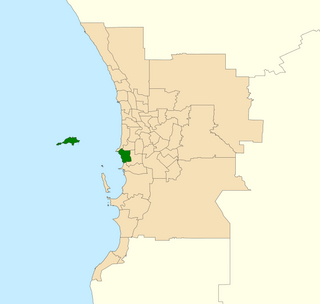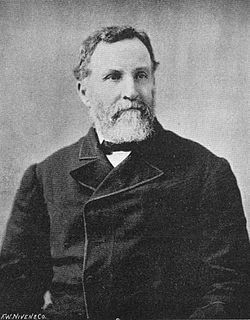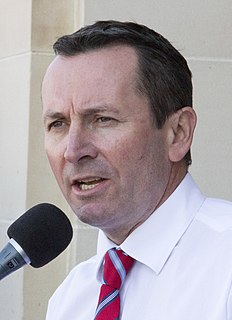Related Research Articles

Peppermint Grove is an affluent western suburb of Perth, Western Australia on the north bank of the Swan River at Freshwater Bay. Its local government area, the smallest in the country, is the Shire of Peppermint Grove. The suburb was named after its trademark Swan River peppermint trees lining many streets. The suburb has long been associated with Western Australia's wealthiest and oldest families. Their prosperity is reflected in the many historical houses in the area, such as The Cliffe and the Federation Queen Anne style St Just. Colin Barnett, a former Premier of Western Australia, dubbed the suburb "Monaco of WA" due to its small size and concentration of wealth.

The Division of Fremantle is an electoral division of the Australian House of Representatives in Western Australia.
The Morgans Ministry was the fourth ministry of the Government of Western Australia, led by Alf Morgans of the Ministerialist faction. It succeeded the First Leake Ministry on 21 November 1901, and was followed by the Second Leake Ministry on 23 December 1901.

Thomas George Anstruther Molloy was an Australian politician. He was a member of the Western Australian Legislative Assembly for the electorate of Perth from 1892 until 1894, and thereafter became a perennial candidate, unsuccessfully standing for parliament 14 times. He also served two terms as the Mayor of Perth, from 1908 to 1909 and from 1911 to 1912. Molloy also made a significant contribution to the cultural life of Perth, building numerous hotels and the first two theatres in the city, most notably His Majesty's Theatre, which is still open today.

Timothy Francis Quinlan KSS was an Irish-born Australian politician who represented the electorates of West Perth and Toodyay in the Western Australian Legislative Assembly between 1890 and 1894, and 1897 and 1911, respectively. Quinlan was also Speaker of the Assembly for a period of time between 1905 and 1911.

The Electoral district of Pilbara is a Legislative Assembly electorate in the state of Western Australia. Pilbara is named for the region of Western Australia in which it is located. It is one of the oldest electorates in Western Australia, with its first member having been elected to the Second Parliament of the Legislative Assembly at the 1894 elections.

The Electoral district of Perth is a Legislative Assembly electorate in the state of Western Australia. Perth is named for the capital city of Western Australia whose central business district falls within its borders. It is one of the oldest electorates in Western Australia, with its first member having been elected in the inaugural 1890 elections of the Legislative Assembly.

Fremantle is an electoral district of the Legislative Assembly in the Australian state of Western Australia.

Frederick Illingworth, Australian politician, was a Member of Parliament in two Australian states, and a government minister in Western Australia. As a financier of land speculation in Victoria in the 1880s, he was heavily involved in the Victorian land boom.

George Randell was an Australian businessman and politician. He served intermittently in the Parliament of Western Australia between 1875 and 1910, including as a minister in the government of Sir John Forrest.

Elections were held in the state of Western Australia on 3 October 1911 to elect 50 members to the Western Australian Legislative Assembly. The Labor Party, led by Opposition Leader John Scaddan, defeated the conservative Ministerialist government led by Premier Frank Wilson. In doing so, Scaddan achieved Labor's first absolute majority on the floor of the Assembly and, with 68% of the seats, set a record for Labor's biggest majority in Western Australia. The record would stand for nearly 106 years until Labor won 69% of seats at the 2017 election. The result came as something of a surprise to many commentators and particularly to the Ministerialists, as they went to an election for the first time as a single grouping backed by John Forrest's Western Australian Liberal League, under a new system of compulsory preferential voting and new electoral boundaries both of which had been passed by Parliament earlier in the year despite ardent Labor opposition.
Elections were held in the state of Western Australia between 27 April and 26 May 1897 to elect 44 members to the Western Australian Legislative Assembly. The Ministerialist group led by John Forrest won a third term in office as a result of the elections. The poll took place based on boundaries established in the Constitution Act Amendment Act 1896, which increased the number of members from 33 mainly by adding new seats in the Goldfields region, and had been called a year earlier than was necessary. In 18 of the 44 seats, only one candidate nominated and polls were not held.
This is a list of members of the Western Australian Legislative Assembly between the 1901 election and the 1904 election, together known as the Fourth Parliament.

Mount Lawley is an electorate in the state of Western Australia. Mount Lawley is named for the inner north-eastern Perth suburb of Mount Lawley which falls within its borders.
The Electoral district of Mount Hawthorn was a Legislative Assembly electorate in the state of Western Australia. The district was named for the inner northern Perth suburb of Mount Hawthorn, which fell within its borders.
The Electoral district of North Perth was a Legislative Assembly electorate in the state of Western Australia. The district was named for its location immediately to the north of the central business district of Perth.
Barrington Clarke Wood was an Australian businessman and politician who served in both houses of the Parliament of Western Australia. A minister in the governments of Sir John Forrest and George Throssell, he was a member of the Legislative Assembly from 1894 to 1901, and then a member of the Legislative Council from 1902 until his death.

Elections were held in the Colony of Western Australia in December 1890 to elect 30 members to the Legislative Assembly. They were the first elections to be held for the Legislative Assembly, which had been created earlier in the year by a new constitution that granted Western Australia responsible self-government.

Elections were held in the Colony of Western Australia in June and July 1894 to elect 33 members to the Legislative Assembly. Less than half of the seats were contested and virtually all campaigns were fought on local issues, although a few candidates were endorsed by extraparliamentary organisations. The election presented no threat to the government of Sir John Forrest, but its aftermath saw the establishment of a credible opposition for the first time, led by George Randell.

The 2021 Western Australian state election was conducted on Saturday 13 March 2021 to elect members to the Parliament of Western Australia, where all 59 seats in the Legislative Assembly and all 36 seats in the Legislative Council were up for election.
References
- ↑ de Garis, Brian (1981). "Self-government and the evolution of party politics". In Stannage, C.T. (ed.). A New History of Western Australia. Nedlands: University of Western Australia Press. p. 336. ISBN 0-85564-170-3.
- ↑ de Garis (1981), p.342-343.